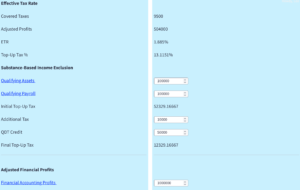Menu
Trending Now
Jurisdictions implementing Pillar Two are expected to introduce domestic legislation that gives effect to Pillar Two on the same basis as the OECDs Model Rules.
The UK draft legislation generally does this (aside from a couple of aspects that differ – see A Review of the UKs Draft Pillar Two Legislation).
Nevertheless, the calculation as to whether any top-up tax is due is complex.
The simple calculator below shows you the steps that are required to calculate top-up tax under the UKs draft legislation for Pillar Two.
Although both covered taxes and adjusted financial profits (which are the numerator and denominator in the jurisdictional effective tax rate (ETR) calculation) are based on the financial accounts, there are then a significant number of adjustments to actually calculate the UK multinational top-up tax.
In additional, as well as the current tax expense in the financial statements, deferred tax is also taken into account (again from the accounts but then adjusted).
Profits and taxes also need to be allocated to the correct entity, therefore if there is a permanent establishment, a CFC or transparent entity further adjustments are made.
Any taxes on intragroup dividends (typically withholding taxes) are allocated to the payor jurisdiction (even though for both tax and accounting purposes they are usually taken into account by the recipient given they have suffered the tax).
The calculator below is meant as a simple illustration of the calculation aspects of the multi-national top-up tax. The calculation in practice will be significantly more complex as jurisdictional blending would need to be considered, as would the treatment of investment entities, minority-owned entities and the top-up tax allocation and payment provisions.

| Cookie | Duration | Description |
|---|---|---|
| cookielawinfo-checkbox-analytics | 11 months | This cookie is set by GDPR Cookie Consent plugin. The cookie is used to store the user consent for the cookies in the category "Analytics". |
| cookielawinfo-checkbox-functional | 11 months | The cookie is set by GDPR cookie consent to record the user consent for the cookies in the category "Functional". |
| cookielawinfo-checkbox-necessary | 11 months | This cookie is set by GDPR Cookie Consent plugin. The cookies is used to store the user consent for the cookies in the category "Necessary". |
| cookielawinfo-checkbox-others | 11 months | This cookie is set by GDPR Cookie Consent plugin. The cookie is used to store the user consent for the cookies in the category "Other. |
| cookielawinfo-checkbox-performance | 11 months | This cookie is set by GDPR Cookie Consent plugin. The cookie is used to store the user consent for the cookies in the category "Performance". |
| viewed_cookie_policy | 11 months | The cookie is set by the GDPR Cookie Consent plugin and is used to store whether or not user has consented to the use of cookies. It does not store any personal data. |